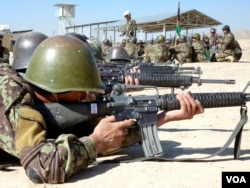A U.S. government auditor blames flawed U.S. planning, training and oversight for the inability of Afghan forces to secure their country from threats and prevent the re-establishment of terrorist havens. The head of the independent agency warns that billions of dollars could be wasted unless changes are made to the way Afghan troops are trained.
The assessment from John Sopko, the Special Inspector General for Afghanistan Reconstruction, or SIGAR, follows a U.S. decision to send more than 3,000 additional troops to Afghanistan, an increase of more than 25 percent in the number of American forces there.
America’s mission, he said, is “to try to win the hearts and minds” of the people in Afghanistan so they will fight for their country, but notes that effort first needs to be focused on Afghan forces.
"They are not going to fight if they know they are not going to get paid,” added the SIGAR chief, whose office released a report to highlight lessons learned from the past 16 years to improve future training efforts.
Sopko also pointed to problems within the system, namely concerning morale, illiteracy, drug abuse and corruption. In response to a question, he said some soldiers' widows have been forced to offer "sexual favors" to receive pension benefits.
"Would any American put up with that?" asked Sopko in a speech Thursday at Washington's Center for Strategic and International Studies. Afghan officials did not immediately comment on the allegation.
Afghan forces continue to struggle with terrorism and a resilient Taliban insurgency because the $70 billion in U.S. security assistance has suffered from serious problems over the last 16 years, many of which still persist, Sopko said. The Taliban control more than 40 percent of Afghan territory.
In the aftermath of U.S. President Donald Trump’s new Afghan strategy, Sopko advocated taking “fresh” and “bolder” looks at Afghan National Defense Security forces. He said SIGAR’s report offers a better way forward for the Afghan people and ultimately a more successful way to hasten the end of America’s longest war.
“Now more than ever I would urge it is necessary not to dwell upon failure but to learn the lessons from the last 16 years and improve security sector assistance efforts,” said Sopko.
On the sidelines of the United Nations General Assembly in New York Thursday, President Trump met with his Afghan counterpart, Ashraf Ghani, who thanked Trump for increasing the number of American troops in Afghanistan. "The additional troops ...are to enhance the assist, support, advice mission and that is playing a very crucial role."
Trump said, "I think it's important to understand that the Afghan soldiers are doing the fighting. We're training and we're working with them very closely, but it's the Afghans that are doing the fighting..."
The SIGAR report found the U.S. government was “ill-prepared” to conduct security assistance programs of the size and scope required in Afghanistan, where 70 percent of the population is illiterate and largely unskilled.
“Consequently, the Afghan security forces were ill-prepared to deal with the deteriorating security situation after the drawdown of U.S. combat forces,” said Sopko.
He added, mostly untrained U.S. military officers and coalition officers are conducting the training mission for Afghans.
President Ghani discussed some of SIGAR’s assessments while delivering a speech in New York this week.
Ghani said that a lot of criticism the U.S. agency had directed at the performance of the Afghan Defense Ministry is “in the process of correction.” He added, a three-star Afghan army general, for the first time, was tried by a court and given a jail term for stealing fuel.
“We are not in denial about what we inherited. But what we are responsible for is the tenure of going forward,” Ghani said.






